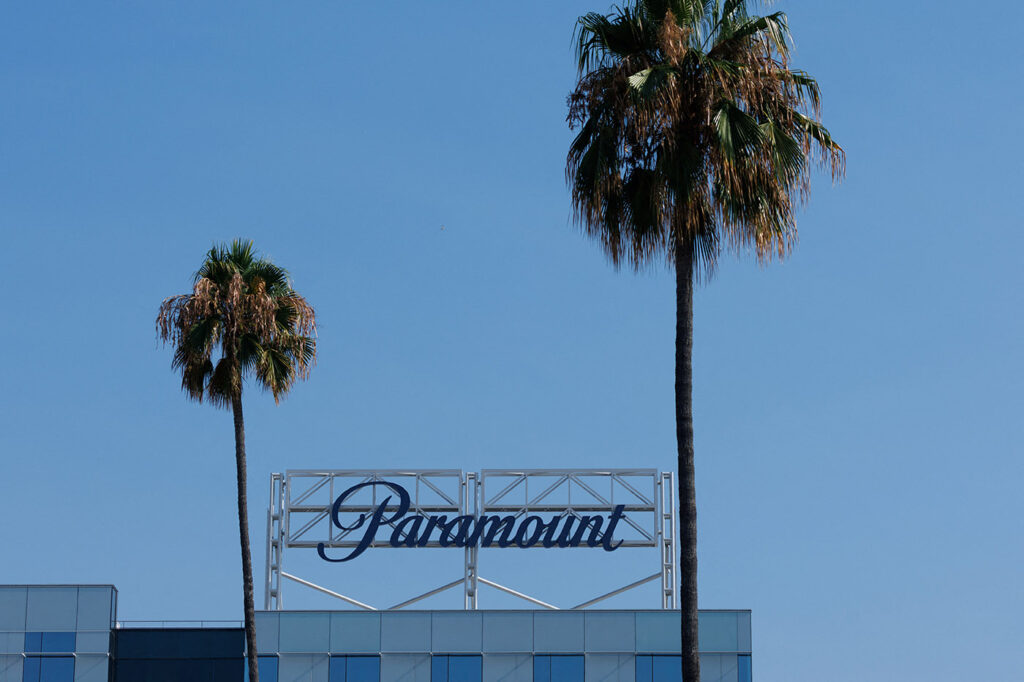The hit animation series “South Park,” streamed by Paramount, started its 27th season in July, controversially mocking President Donald Trump by depicting him as being in a relationship with the devil.
The episode, titled “Sermon on the ‘Mount,” references various real-life scenarios, including the defunding of National Public Radio; bringing Christianity into public schools; an overuse of ChatGPT; community protests and scared news reporters; and President Trump’s inclination to file lawsuits.
The character of Jesus came to break bread with protesters, who were, according to a cartoon newscaster, “uniting in solidarity against what they call the president’s oppression.”
“Now just eat the bread and listen. I didn’t want to come back and be in the school, but I had to because it was part of a lawsuit and the agreement with Paramount,” Jesus said in a loud whisper, standing on a mound of dirt in the middle of the crowd. A confused protester asked “The president’s suing you?”
“The guy can do whatever he wants now that someone backed down, OK?” Jesus replied. “You guys saw what happened to CBS? Yeah, well, guess who owns CBS? Paramount! You really want to end up like Colbert? … Just shut up or we’re going to get canceled you idiots.”
The season was released soon after Paramount settled with Trump for $16 million, following a defamation lawsuit the president filed against “60 Minutes,” claiming the editing of an interview with his Democratic rival then-Vice President Kamala Harris was deceptive. Bob Corn-Revere, chief counsel for the Foundation for Individual Rights and Expression, told Politico the lawsuit was “frivolous,” and “all [the settlement] really shows is that sometimes, a bully can get his way.”
The settlement occurred while Paramount was simultaneously seeking the Trump administration’s approval for a merger with Skydance Media — which closed successfully in early August. The settlement was described by Stephen Colbert as a “big fat bribe,” whose “Late Show” was canceled shortly after by Paramount-owned CBS.
The creators of South Park, Trey Parker and Matt Stone, signed a $1.5 billion, five-year contract with Paramount Global just a day before releasing its first episode of the season.
In the season’s second episode, main character Eric Cartman became a right-wing podcaster resembling right-wing activist Charlie Kirk. Cartman was featured as a “master debater” against “woke” college students. He has Kirk’s hairstyle and attended an event where “The Charlie Kirk Award for Young Master Debaters” was awarded to his rival. But last week, Kirk was assassinated on a Utah university campus, prompting Comedy Central to pull the episode from its schedule. Some Kirk supporters have reportedly blamed the franchise for his assassination on social media.
South Park episodes are satirical in nature, protecting it from any legal action that could be taken by the president.
First Amendment Watch spoke with David Korzenik, media law attorney and former adjunct professor at The Benjamin N. Cardozo School of Law at Yeshiva University in New York City. Korzenik discussed the First Amendment protections that are applied to satirical content; explained why a lawsuit against “South Park” by President Trump would likely be unsuccessful; and argued why those who criticize the president should be immune from defamation lawsuits he might file against them.
Editor’s note: This interview has been edited and condensed for length and clarity.
FAW: If President Trump filed a defamation lawsuit, he would have to successfully prove that the South Park creators acted with “actual malice.” But would “actual malice” apply to political satire? Could a defamation suit be successful?
Korzenik: I don’t see how he could successfully sue them. Anybody can sue anybody for anything, and they do in this country, more and more, since the country has become incredibly unhinged. But that doesn’t mean it’s a deserving or appropriate lawsuit. It [would be] a SLAPP [Strategic Lawsuit Against Public Participation] suit. The truth of the matter is it’s offensive and insulting, and therefore you don’t even get to actual malice, because it’s clearly a straight-out, non-actionable opinion. And if anyone were to try to claim that this suggests that he actually had sexual relations with the devil, that’s nuts. That’s not a factual assertion. And no reader thinks that that’s the case. It’s a straight out insult, and insults are protected. They’re protected because they are not factual. It’s possible that some insults could be, but not this, not a cartoon, not one involving the devil.
There could be ways in which you could frame a cartoon to make it a factual assertion, but I don’t see that this is anything close to that. So you don’t even get to actual malice, because actual malice would only come into play if something were a factual assertion. They’re just saying he’s a bad guy, and not only is he close to the devil, but he has sex with the devil. There are people who actually maybe think that there is a real devil, or that he has a direct relationship with Satan, but that’s not what reasonable, like-minded people think.
FAW: In Hustler Magazine v. Falwell (1988), the Supreme Court found that public figures must show “actual malice” to successfully prove a claim of intentional infliction of emotional distress. How might this precedent apply to South Park’s defense if President Trump were to file a lawsuit against its creators?
Korzenik: Well, if he did, he would have to assert that it was a factual assertion, and then he would also have to plead in his complaint that they published it with a high degree of awareness of its probable falsehood. So he would have to identify what the factual assertion was in this cartoon, and then he would have to have some kind of factual pleading that would show that they knew that that was not true. And often libel cases that require allegation of actual malice, require that it be pleaded with more than just conclusory kind of assertions. He couldn’t just say, “They published this knowing that it was false, or with a high degree of awareness of its probable falsehood,” or that they subjectively believed it to be false. And he would have had to identify what the factual assertion was. Obviously nobody thinks, no reader thinks, that he slept with the devil. No reader would see that cartoon and think that that was so. I don’t think this case would ever get that far beyond possibly just a failure of the pleading to effectively plead all of the elements of libel, which would include actual malice. So I don’t even know what that complaint would look like, but that complaint probably would fail on a whole lot of levels, including an actual malice pleading. I wouldn’t put it past them to try to say that, but I would think there’s a high probability that actual malice couldn’t be effectively pleaded in a way that would survive a motion to dismiss under Iqbal or any of the pleading requirement standards.
FAW: Why is it important for South Park to maintain its First Amendment right to create political satire? What would satirical cartoons like South Park, Family Guy, or other similar television parodies look like without this protection?
Korzenik: Keep in mind that part of their protection is not really purely constitutional. In other words, if you were thinking that perhaps New York Times v. Sullivan was somehow undone by this Supreme Court, I don’t think it would have any significant bearing on parody. The reason that parody is protected is largely due to the fact that it is understood by the reader not to be an assertion of fact, but to be an expression of humor and insult, perhaps, and therefore doesn’t project any factual assertion that it could be actionable. In all states, you can only sue for a false factual assertion. You cannot sue for an opinion. And so the Milkovich case is the way in which the First Amendment is understood to protect parody or opinion, and some state constitutions protect it even more powerfully, such as New York and several other states where opinion is given a much broader kind of interpretation. New York Times v. Sullivan isn’t really the bulwark that protects parody. It’s the fundamental requirement that no one can sue for defamation or for speech that is understood to be opinion and insult. It has some constitutional dimension, but not much, under Milkovich. It’s more a feature of what the common law of defamation requires, and in those states like New York that give a higher level of protection to opinion, parody would have a more powerful zone of protection there on a state constitutional level. It’s true that if someone were able to tease out some factual assertion that was contained within the parody — and that would be very hard to do in the case of the South Park cartoon — they would then have to identify that, focus on it, show that it was false and that the plaintiff understood that it was a factual assertion that they intended to make, and that they knew it to be false subjectively at the time that they published it. Now it’s true that no one necessarily thinks that it’s true, including the one who produces it or writes it, but the frontline defense of parody is always going to be the fact that it is opinion, that it’s not factual, that it’s an insult, that it’s crazy and that no reader reads it in any other way except to view it as insulting. So in other words, parody has a wide zone of protection. By the way, often when we think about parodies, that phrase is often most significant in the copyright and trademark zone, where they come into a fair use-type analysis, but parody is protected under fair use against copyright and other kinds of claims of that sort. But when you’re dealing with libel and intentional infliction of emotional distress, I think the front line of defense is opinion, not interpreted as fact by any objectively reasonable reader or viewer.
FAW: At the beginning of the episodes, a disclaimer states: “ALL CHARACTERS AND EVENTS IN THIS SHOW–EVEN THOSE BASED ON REAL PEOPLE–ARE ENTIRELY FICTIONAL. ALL CELEBRITY VOICES ARE IMPERSONATED…..POORLY.” Is a disclaimer like this necessary for satirical content?
Korzenik: My view is it’s not necessary in most parodies, because the reader knows what it is right off. Disclaimers help a little bit, and it’s good to include them because juries and judges sometimes take them seriously. It depends upon how it’s written and what it’s addressed to, and it would really turn on those kinds of things. Disclaimers don’t guarantee protection, but they help, and they sort of drive against the assertion that a reader would consider the statement to be an assertion of fact or about anyone in particular.


